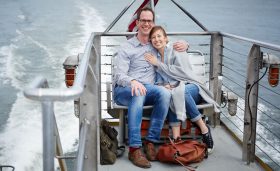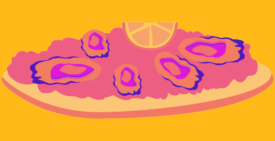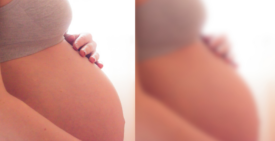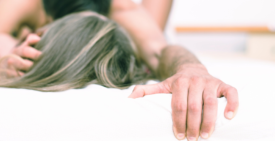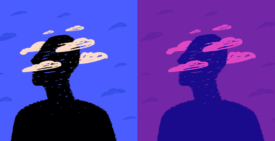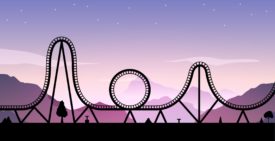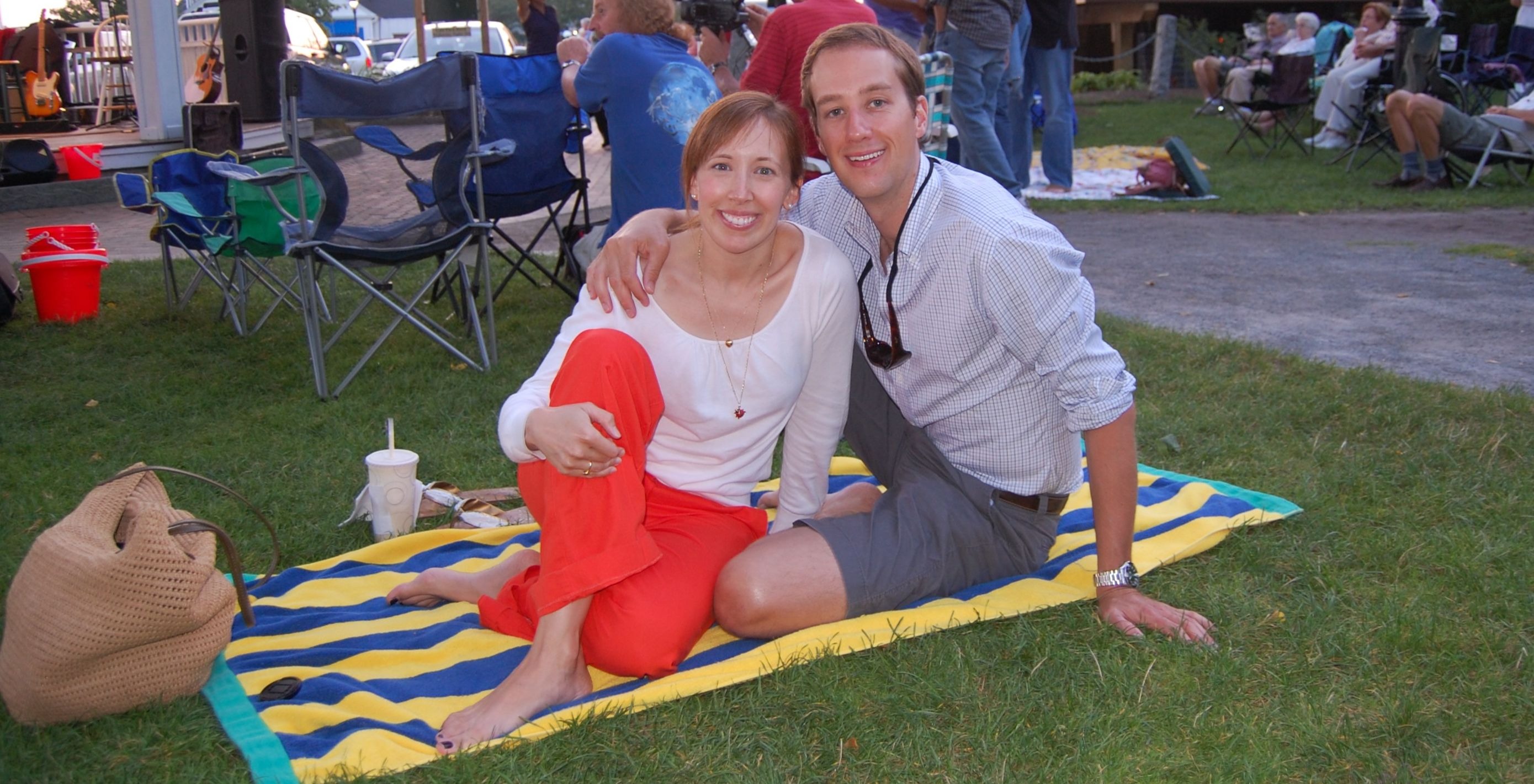
The author and her late husband, Erik. (Courtesy of Lisa Kolb)
Late last spring, I took myself on a picnic. My fiancé, Brodie, was on a business trip, and I was recuperating from a nasty cold. My nose was raw. I’d been in my polka dot pajamas for days, binge-watching “The Crown” under a quilt. I figured that extracting myself from a nest of balled-up tissues and lozenge wrappers to spend an hour in the sunshine sipping soup seemed like good self-care.
So I showered, put on my red sundress and packed chicken soup and a book. I had not finished a book since my husband Erik died three years earlier, rendering me fuzzy-brained and afraid of silence. Still, I liked the idea that I might read a book again, someday.
The day blossomed with all the springtime clichés as I drove to the park: turquoise sky, sun-dappled trees, a breeze soft like a kiss. There was honest-to-God birdsong. I spread my picnic blanket on the grass and was halfway through my soup when I noticed a tick on my knee. I bent closer, and flicked it away. The whole thing took two seconds.
But it was a loaded two seconds. In the time it took me to swat a tick, I thought:
What if I hadn’t seen that tick and got Lyme disease? Brodie can’t handle another sick wife. What if I die? What if Brodie dies? What if his plane crashes? I can’t handle losing another husband. Does he have his paperwork and passwords somewhere? What if….
And with that, I packed up my picnic and left.
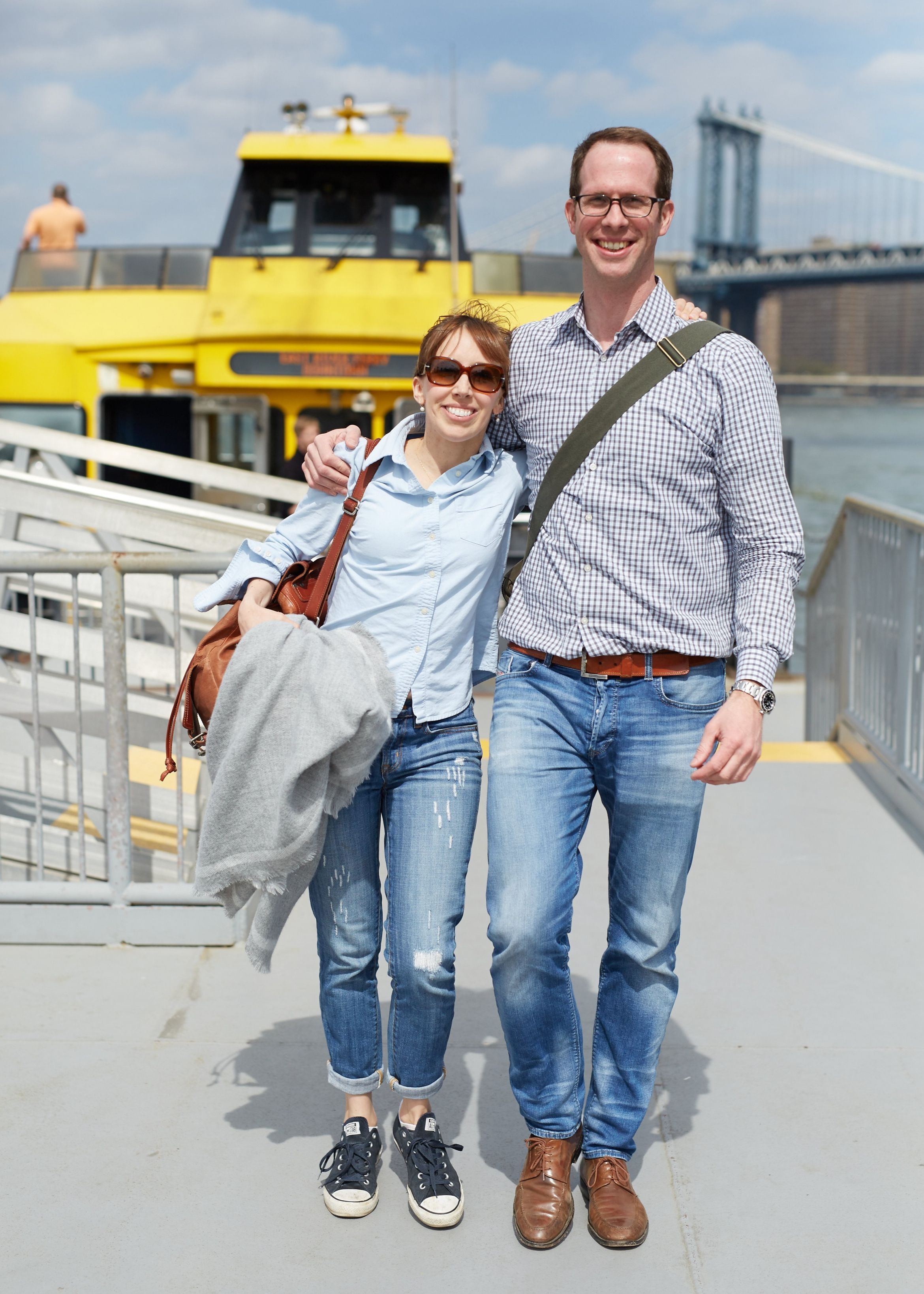
The author and her fiance, Brodie. (Michael Falabella)
Before words like “self-care” and “young widow” entered my vocabulary, picnics were just picnics. Goodbye meant until later that day. Someone’s dead phone was just a dead phone, not a portent of death itself. But my brain has been rewired by tragedy.
Erik and I used to spend New Year’s in Maine. We would drive up the freezing coast and stroll the margins of our favorite rocky harbors. Stacks of lobster traps lined the weathered docks, green cages with two chambers separated by a mesh funnel where the lobster crawls in, but cannot get out.
That is me now. I have gone through a tunnel to another side. It is a parallel universe, this lobster trap of mine: I swim in the same water, but I am in a wholly different life, unable to get back to the other side, to the person I used to be. To Erik.
I catch myself wondering what I would be doing if he had not died. Would we still live in Brooklyn? Would we have had children? Would he still be using all the pots and pans every time he cooked dinner? Would we be happy?
Then I stop myself. Must. Focus. On. Present. Reality. And. Happiness.
And I am happy. In the midst of my grief came Brodie, a widower in the midst of his. We fell in love. I love him immeasurably. I love his passion and intelligence. I love his big laugh and crazy dance moves. I love that as children, we both wanted to be spies. We are the annoying couple that completes one another’s sentences.
People are happy for us. It seems like a beautiful ending.
Yes, but also no. Here on this side of the lobster trap, things are more complex. Even beautiful things are tinged bittersweet. Brodie and I have been engaged for almost two years, with no wedding plans. The thought of wedding dress shopping or walking down an aisle makes me remember the first time I did so, and the happiness fills me with heartbreak. Brodie and I wait for time to soften these happy wedding memories into tolerability so that we can make our own such memories. We wait some more.
“Don’t die until we’re really old,” I whispered to Brodie in bed that night, after he returned from his business trip.
“You, too,” he said, and snuggled me closer.
We say goodnight this way sometimes. It is a weird, double-widowed “I love you.”
Will my grief brain be a fly in the ointment — the tick on my leg — for the rest of my life? Will I always jump to panic mode if Brodie runs 10 minutes late? Will I always save voicemails in case someone dies? Will I ever read a book?
The more time passes since Erik’s death, the more I think that I am forever altered by grief. There are two ways of thinking about this. One is: dammit. The other is: There is strength in these scars. I choose the latter.
Despite having loved deeply and lost greatly, I have anted up to love someone again. I am putting one imperfect foot in front of the other, whether to a picnic or down an aisle. And I am proud of that.
Still, I like the idea that I might say goodnight without the “don’t die” stuff again, someday.
Lisa Kolb is a writer who divides her time between Washington, D.C. and Brooklyn, NY. Her writing has appeared in The Washington Post, Food52, Remedy Quarterly, and more. She is the editor of Unpeeled, a food blog focusing on women in food, launching March 2018.

